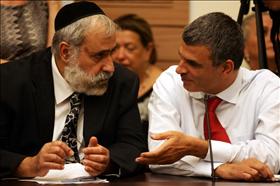Civil society is more than good manners
Hiddush releases proposal for implementing Civil Society in the State of Israel
Hiddush released an detailed plan for implementing a civil society in the State of Israel for members of the new Knesset. The proposal is based around an additional Basic Law to implement religious freedom and conscience in Israel.
10/03/2013 15:40
Tags: 19th Knesset · civil society · religious freedom · equality in sharing the burden ·

Knesset Members, Nissim Ze'ev from Shas and Moshe Kahlon from the Likud at a Knesset meeting. Photograph; Kobi Gideon, Flash 90.
Hiddush- Freedom of Religion for Israel released its platform for civil society in Israel for the first time to members of the 19th Knesset. Hiddush's plan was released following the establishment of the new Knesset, which includes a wide variety of Knesset members and parties, many of them hoping to bring significant changes in these fields during the upcoming term Hiddush distributed both a wide variety of reports and documents relating to religion and state in Israel to the Knesset members. Among them was the organization's annual Religion and State Index from 2012 that reported on the widening gap between the public's desire for freedom of religion and equality in sharing the burden, and the current policy of the government which does not provide for either issue. The summary of the activities of the 18th Knesset was additionally distributed which demonstrated the failure of the previous Knesset to properly address the challenges of religion and state in Israel, issues such as equality in sharing the burden, gender segregation, and the conversion crisis.
In a letter to members of the new Knesset, Hiddush President, Rabbi Uri Regev, and Vice President of the organization, Shahar Ilan noted that "It's fair to say that the failure of the 18th Knesset in the areas of freedom of religion and equality in sharing the burden is one of the central reasons that the voting public sent almost half of the former Knesset members home. We hope that the current Knesset will realize the immense hopes of the public and the mandate that it was given in order to promote a civil agenda." According to Rabbi Regev and Ilan, "The Declaration of Independence promised "[The State of Israel] will ensure complete equality of social and political rights to all its inhabitants irrespective of religion, race or sex; it will guarantee freedom of religion." After 65 years, these Knesset members are finally trying to realize this promise."
We hope that the current Knesset will realize the immense hopes of the public and the mandate that it was given in order to promote a civil agenda."
What does a Civil Society look like?
-Constitution: The Knesset will legislate a Basic Law (in addition to the 14 that already exist) that would guarantee freedom of religion and conscience
-Army/National Service enlistment for ultra-Orthodox students: There will be a quota system for yeshiva students to decide on objective basis of excellence in Rabbinic Studies who will receive deferrals from army service. The deferral would be for 3% of potential enlistees for each draft (currently around 1,500 students). Economic and civic sanctions will be applied against students who refuse to serve.
-Core Curriculum in all schools: School curriculums that include mathematics, sciences, English, and civics courses will be mandatory for all state-funded schools. Schools that do not teach the core curriculum in its entirety will not receive state funding.
-Allowances for families with children: Until now, a family with more children received more money per child as the number of children rose, favoring large families. Hiddush proposes to grant an equal amount of money to the family per child.
-Ultra-Orthodox yeshiva students in the workforce: The government will implement a plan to reduce benefits and subsidies for yeshiva students who do not work as an incentive to encourage entrance into the general workforce.
-Civil Marriage: Civil marriage will be a legal option for any couple who wants to get married, regardless of religious affiliation. The ceremony will be held in civil courts or municipalities. Religious ceremonies from all Jewish denominations [and other faiths] will be accepted as legal and binding.
-Conversion: The State of Israel will accept all conversions performed in the recognized Jewish communities of the major streams in Judaism in Israel or the Diaspora for civil purposes and immigration under the Law of Return.
-Exclusion of women and gender-segregated bus lines: a law should be enacted that will criminalize the exclusion and discrimination against women. Segregation between men and women on public buses will be outlawed.
-Public transportation on Shabbat: Bus lines or shuttles will operate on Shabbat through central routes to specific locations, such as hospitals, emergency rooms, public entertainment and cultural areas, and beaches.
-Kosher Certification: The government will reduce its involvement in kosher-certifying organizations from all denominations in order to allow for more sensible and economical supervision under a free-market model.